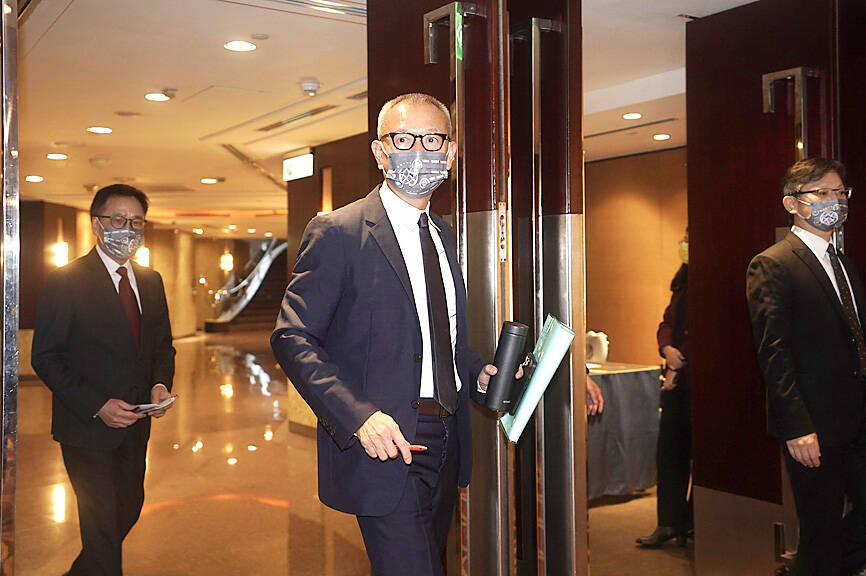Yageo Corp (國巨) yesterday saw its stock price rally 5.69 percent despite the world’s No. 3 maker of passive components expecting revenue to sequentially drop single-digit percentage points this quarter, as customers face a longer inventory digestion cycle likely to persist through the second quarter of next year.
Weakening demand could push factory utilization down to about 85 percent this quarter for its premium product lines, compared with 90 percent last quarter, Yageo said.
Factory usage for commodity-type product lines is to be much lower this quarter, dipping to between 45 percent and 55 percent from between 50 percent and 60 percent last quarter, the New Taipei City-based company said.

Photo: CNA
Yageo expects weak demand for commodity products used in consumer electronics such as computers and smartphones to have a “limited” impact, as those products make up a smaller revenue share at about 25 percent, Yageo president David Wang (王淡如) told an online investor’s conference on Thursday.
Although the industry is entering a prolonged inventory correction cycle, Yageo expects its book-to-bill ratio to be close to 1 for premium products used in industrial devices and automobiles — particularly autonomous vehicles — said Claudio Lollini, Yageo’s executive vice president of global sales and marketing, indicating that demand for the company’s components would be stable in the final quarter of this year.
Pricing is also showing signs of stabilizing this quarter and in the first quarter of next year, Lollini said.
The pricing pressure mainly comes from commodity products extending from last quarter, and demand from China is relatively weaker than other regions, he said.
Sales to China made up 19 percent of Yageo’s overall revenue last quarter, while the US is the company’s biggest revenue source with a contribution of 34 percent, Yageo data showed.
Yageo’s revenue expanded 4.8 percent year-on-year to NT$30.8 billion (US$965.37 million), representing a quarterly decline of 1.7 percent.
Gross margin is expected to fall 2 percentage points this quarter from 38.5 percent last quarter, Yageo said.
The stock price of Yageo increased 5.69 percent to NT$445.5 yesterday, versus the TAIEX’s gain of 3.73 percent.
Net profits last quarter contracted 6.3 percent to NT$6.4 billion, compared with NT$6.83 billion a year earlier, the second-highest level in the company’s history. On a quarterly basis, net profits expanded 7.9 percent from NT$5.93 billion.
Earnings per share (EPS) fell to NT$12.1 last quarter, from NT$13.88 in the third quarter last year. That was an increase from NT$11.05 in the second quarter.
During the first three quarters of this year, Yageo’s net profit rose 2.2 percent to NT$18.57 billion, compared with NT$18.17 billion during the same period last year. EPS improved with a 34.74 percent increase from NT$36.83.

SEMICONDUCTORS: The German laser and plasma generator company will expand its local services as its specialized offerings support Taiwan’s semiconductor industries Trumpf SE + Co KG, a global leader in supplying laser technology and plasma generators used in chip production, is expanding its investments in Taiwan in an effort to deeply integrate into the global semiconductor supply chain in the pursuit of growth. The company, headquartered in Ditzingen, Germany, has invested significantly in a newly inaugurated regional technical center for plasma generators in Taoyuan, its latest expansion in Taiwan after being engaged in various industries for more than 25 years. The center, the first of its kind Trumpf built outside Germany, aims to serve customers from Taiwan, Japan, Southeast Asia and South Korea,

POWERING UP: PSUs for AI servers made up about 50% of Delta’s total server PSU revenue during the first three quarters of last year, the company said Power supply and electronic components maker Delta Electronics Inc (台達電) reported record-high revenue of NT$161.61 billion (US$5.11 billion) for last quarter and said it remains positive about this quarter. Last quarter’s figure was up 7.6 percent from the previous quarter and 41.51 percent higher than a year earlier, and largely in line with Yuanta Securities Investment Consulting Co’s (元大投顧) forecast of NT$160 billion. Delta’s annual revenue last year rose 31.76 percent year-on-year to NT$554.89 billion, also a record high for the company. Its strong performance reflected continued demand for high-performance power solutions and advanced liquid-cooling products used in artificial intelligence (AI) data centers,

Gasoline and diesel prices at domestic fuel stations are to fall NT$0.2 per liter this week, down for a second consecutive week, CPC Corp, Taiwan (台灣中油) and Formosa Petrochemical Corp (台塑石化) announced yesterday. Effective today, gasoline prices at CPC and Formosa stations are to drop to NT$26.4, NT$27.9 and NT$29.9 per liter for 92, 95 and 98-octane unleaded gasoline respectively, the companies said in separate statements. The price of premium diesel is to fall to NT$24.8 per liter at CPC stations and NT$24.6 at Formosa pumps, they said. The price adjustments came even as international crude oil prices rose last week, as traders

SIZE MATTERS: TSMC started phasing out 8-inch wafer production last year, while Samsung is more aggressively retiring 8-inch capacity, TrendForce said Chipmakers are expected to raise prices of 8-inch wafers by up to 20 percent this year on concern over supply constraints as major contract chipmakers Taiwan Semiconductor Manufacturing Co (TSMC, 台積電) and Samsung Electronics Co gradually retire less advanced wafer capacity, TrendForce Corp (集邦科技) said yesterday. It is the first significant across-the-board price hike since a global semiconductor correction in 2023, the Taipei-based market researcher said in a report. Global 8-inch wafer capacity slid 0.3 percent year-on-year last year, although 8-inch wafer prices still hovered at relatively stable levels throughout the year, TrendForce said. The downward trend is expected to continue this year,